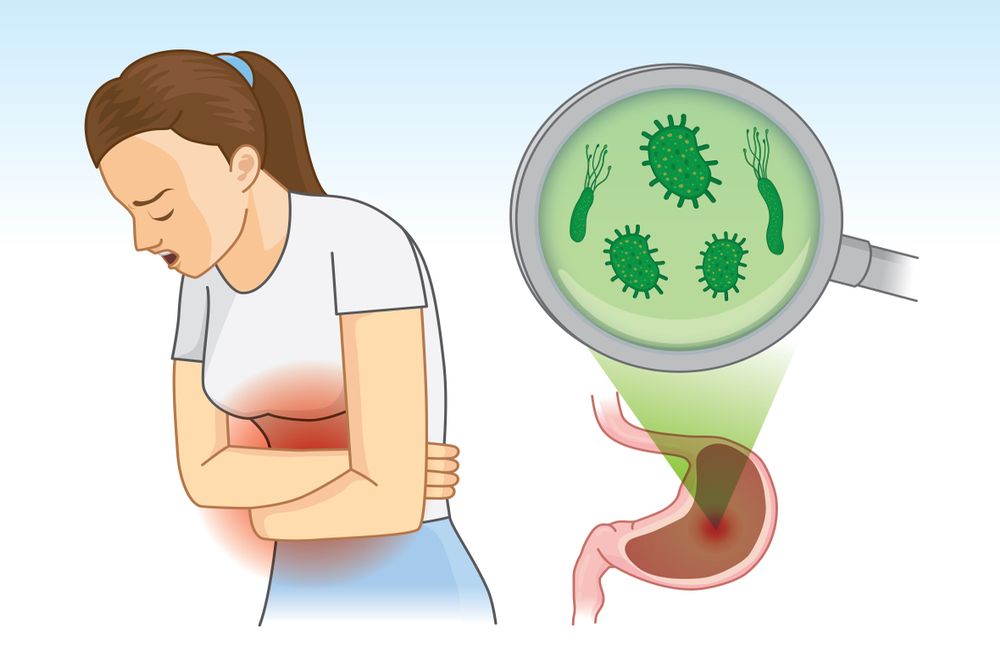Causes Of Diarrhea

The causes of acute and persistent diarrhea differ from those of chronic diarrhea. In many cases, doctors can’t determine the cause of diarrhea. Most diarrhea usually resolves on its own in 4 days, so it is not necessary to find the cause. (7)
Acute and persistent diarrhea
Infections, travelers’ diarrhea, and medication side effects are the leading causes of acute and persistent diarrhea.
Infections
Diarrhea can be caused by three types of infections.
- Viral infections: Viral infections such as norovirus and rotavirus can cause diarrhea. Acute diarrhea is often caused by viral gastroenteritis.
- Bacterial infections: Food and water contaminated with bacteria can lead to diarrhea when consumed. Diarrhea is often caused by bacteria like Salmonella, Escherichia coli (E. coli), Campylobacter, and Shigella.
- Parasitic infections: Parasites may enter your body through water or food and reside in your digestive tract. Diarrhea can be caused by Entamoeba histolytica, Cryptosporidium enteritis, and Giardia lamblia
When food or drink infects the digestive tract, we call them foodborne illnesses. Persistent diarrhea can be caused by infections lasting longer than 2 weeks and shorter than 4 weeks.
Travelers’ diarrhea
Travelers’ diarrhea is caused by drinking water or eating food contaminated with viruses, bacteria, or parasites. In most cases, this diarrhea is acute. However, parasites can cause prolonged diarrhea. People traveling to developing countries may be impacted by travelers’ diarrhea.
Medication side effects
Diarrhea is often caused by certain medicines. Medicines used to treat cancer, antibiotics, and antacids containing magnesium may cause diarrhea.
Chronic diarrhea
Chronic diarrhea can occur due to infections, digestive tract problems, intolerances and food allergies, abdominal surgery, and long-term use of medications.
Infections
Despite treatment, diarrhea caused by bacteria or parasites cannot disappear quickly. A person may also have difficulty digesting carbohydrates such as proteins or lactose in foods such as cow’s milk, dairy products, and soy after an infection. This can prolong diarrhea.
Intolerances and allergies to food
Chronic diarrhea may result from allergies to foods like cereal grains, soy, eggs, seafood, and cow’s milk.
Those with lactose intolerance may suffer from diarrhea after drinking or eating foods containing milk or milk products.
There is a condition called fructose intolerance that may cause diarrhea when people consume foods or liquids that have fructose, a sugar that can be found in fruits, honey and fruit juices. Sweeteners called high-fructose corn syrup use fructose as an ingredient in many foods and drinks.
Many people experience diarrhea after consuming sugar alcohols such as mannitol, sorbitol, and xylitol. These alcohols are found in sugar-free products such as candy and gum.
Digestive tract issues
Chronic diarrhea may result from digestive tract problems such as:
- Celiac disease
- Crohn’s disease
- Functional gastrointestinal (GI) disorders such as irritable bowel syndrome
- Overgrowth of bacteria in the small intestine
- Colitis ulcerative
Abdominal surgery
Having abdominal surgery can lead to chronic diarrhea. Abdominal surgery is an operation on the liver, pancreas, small intestine, large intestine, appendix, gallbladder, stomach or spleen.
Long-term medication use
Chronic diarrhea can be caused by the long-term use of certain medications. Medicines, such as antibiotics, can alter your gut flora and make you more likely to develop chronic diarrhea caused by Clostridium difficile.
You can get diarrhea from a variety of conditions and diseases, including:
- Viruses: Norwalk virus (also known as norovirus), astroviruses, enteric adenoviruses, cytomegaloviruses, and viral hepatitis can cause diarrhea. The rotavirus is one of the most common causes of acute childhood diarrhea. Gastrointestinal symptoms, such as nausea, vomiting, and diarrhea, have been reported in association with the virus that causes coronavirus disease 2019.
- Bacteria and parasites: Exposed to pathogenic bacteria, such as parasites or E. coli through contaminated water or food, leads to diarrhea. Diarrhea caused by bacteria and parasites in developing countries is often referred to as traveler’s diarrhea. The bacteria Clostridium difficile (also called C. diff) can also cause diarrhea, and it may occur after taking antibiotics or during hospitalization.
- Medications: Diarrhea can be caused by various antibiotic medications. By killing bad bacteria, antibiotics alleviate infections, but they can also kill good bacteria. As a result, your intestines are disturbed, resulting in diarrhea or a superimposed infection such as C. difficile. The anti-cancer drugs and magnesium-containing antacids are also known to cause diarrhea.
- Lactose intolerance: Milk and dairy products contain lactose, which is basically sugar. Those who are unable to digest lactose experience diarrhea after eating dairy products. The immune system’s ability to digest lactose declines with age, making you more susceptible to lactose intolerance.
- Fructose: Fruits and honey naturally consist of sugar fructose. Various beverages sometimes contain fructose as a sweetener. People who are unable to digest fructose can suffer from diarrhea.
- Artificial sweeteners: Artificial sweeteners sorbitol, mannitol, and erythritol are non-absorbable sugars found in sugar-free products and chewing gum. These sugars can cause diarrhea in some healthy people.
- Surgery: Surgery to remove part of the intestine or the gallbladder may cause diarrhea.
- Other digestive disorders: Chronic diarrhea may also be caused by other conditions, such as ulcerative colitis, IBS, Crohn’s disease, microscopic colitis, celiac disease, and small intestinal bacterial overgrowth (SIBO).
